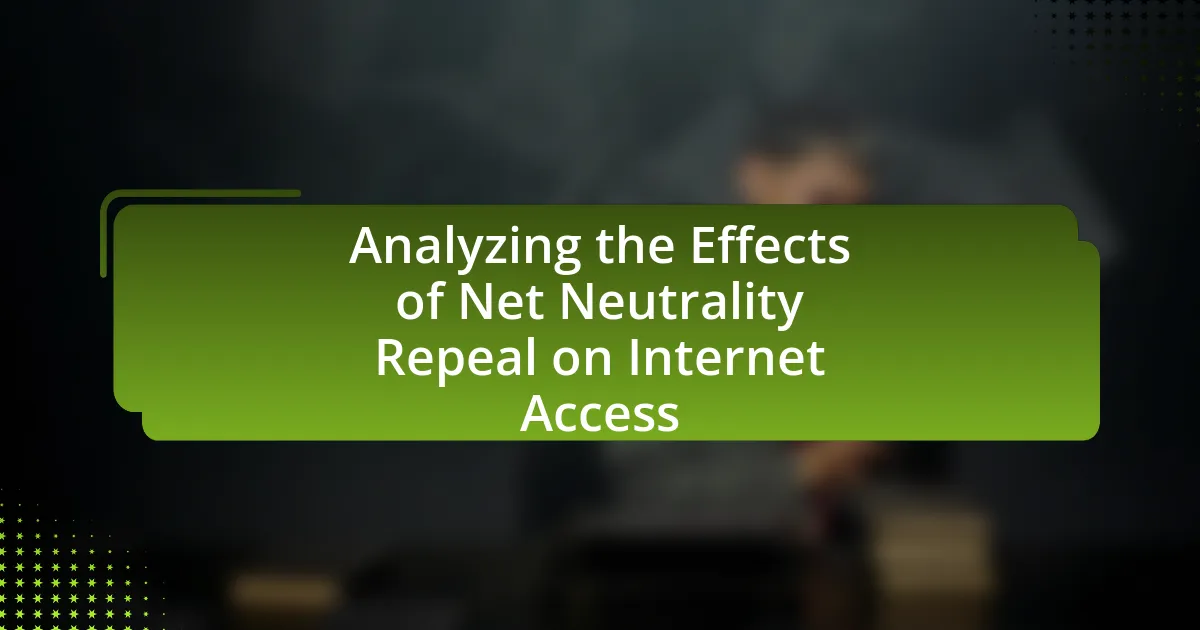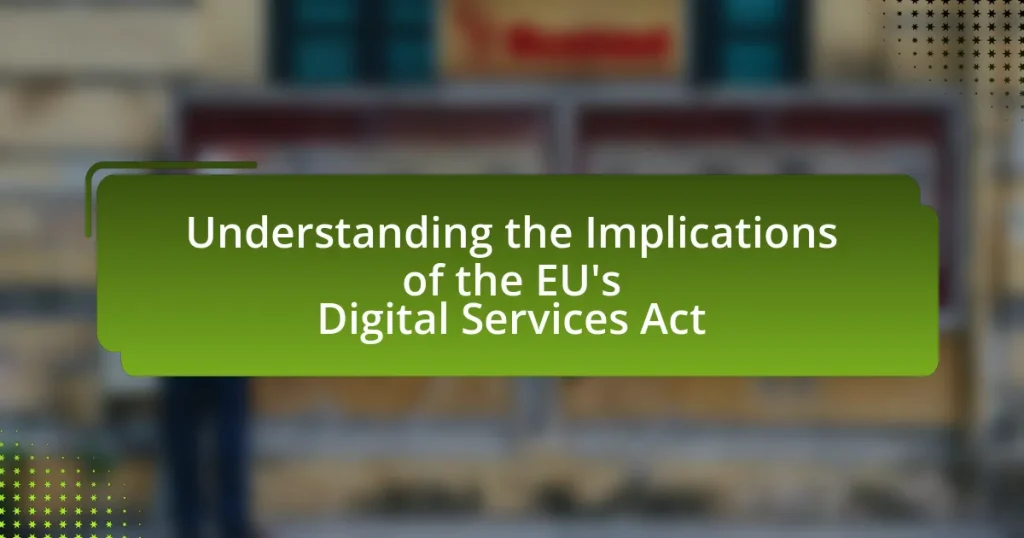The article analyzes the implications of the repeal of net neutrality on internet access, highlighting how this change may lead to disparities in service quality and availability. It discusses the potential for tiered internet experiences, where internet service providers (ISPs) can prioritize certain content, resulting in slower speeds for non-prioritized services and increased costs for consumers. The article also examines the impact on competition, innovation, and small businesses, emphasizing the risks of reduced competition among ISPs and the barriers faced by new market entrants. Additionally, it explores consumer advocacy strategies and the role of public opinion in shaping future regulations to ensure equitable internet access.
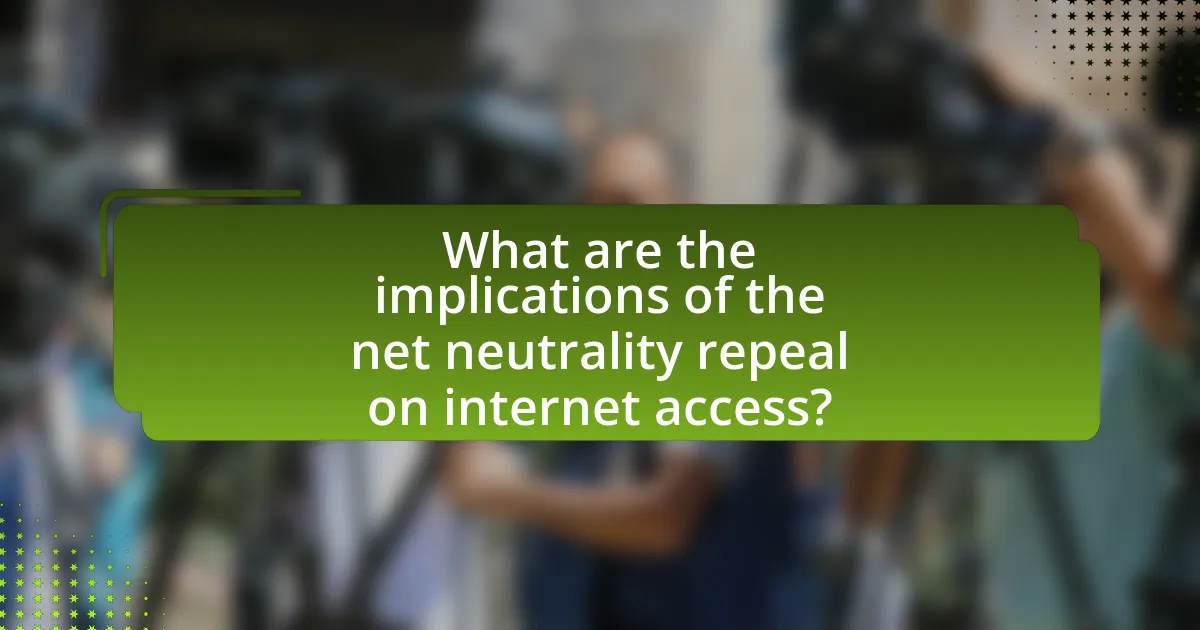
What are the implications of the net neutrality repeal on internet access?
The repeal of net neutrality has significant implications for internet access, primarily leading to potential disparities in service quality and availability. Without net neutrality regulations, internet service providers (ISPs) can prioritize certain content or services over others, which may result in slower speeds for websites that do not pay for preferential treatment. This could create a tiered internet experience where consumers face higher costs for better access to specific services, limiting equal access to information. Studies, such as those conducted by the Federal Communications Commission, indicate that the absence of net neutrality could lead to reduced competition and innovation, as smaller companies may struggle to compete against larger firms that can afford to pay for better service.
How does the repeal of net neutrality affect internet service providers?
The repeal of net neutrality allows internet service providers (ISPs) to prioritize their own content and services over competitors, potentially leading to tiered internet access. This change enables ISPs to create “fast lanes” for certain websites or services, which can disadvantage smaller companies and startups that cannot afford to pay for better access. According to a 2017 report by the Federal Communications Commission, the absence of net neutrality regulations could lead to increased costs for consumers and reduced innovation in the tech industry, as ISPs gain more control over internet traffic and user experience.
What changes can we expect in pricing models for internet access?
Pricing models for internet access are expected to shift towards tiered and usage-based structures. Following the repeal of net neutrality, internet service providers (ISPs) may implement differentiated pricing based on speed, data consumption, and access to specific content or services. For instance, ISPs could offer premium packages for high-bandwidth applications, while basic access may become more limited and less expensive. This trend aligns with historical precedents where deregulation led to increased pricing variability; for example, after the Telecommunications Act of 1996, many providers began offering a range of pricing options based on service levels.
How might service quality vary among different providers post-repeal?
Service quality among different internet providers may vary significantly post-repeal of net neutrality due to changes in competitive practices and prioritization of traffic. Providers may choose to offer tiered service levels, where higher-paying customers receive faster speeds and better reliability, while lower-tier customers experience slower service. This shift can lead to disparities in user experience, as evidenced by historical data showing that after the 2017 repeal, some providers began implementing data caps and throttling practices, which disproportionately affected users on lower-cost plans. Additionally, research from the Federal Communications Commission indicates that without net neutrality, providers have greater latitude to prioritize their own content or that of partners, potentially diminishing the quality of service for competing services.
What impact does the repeal have on consumers and their internet experience?
The repeal of net neutrality significantly impacts consumers by allowing internet service providers (ISPs) to prioritize certain content and services over others. This change can lead to a tiered internet experience where consumers may face slower speeds for non-prioritized services, potentially limiting access to information and increasing costs for premium services. According to a 2017 study by the Pew Research Center, 73% of Americans believe that net neutrality is important for ensuring equal access to online content. This indicates that the repeal could undermine the principle of a free and open internet, affecting how consumers interact with online platforms and services.
How could the repeal lead to a tiered internet experience for users?
The repeal of net neutrality could lead to a tiered internet experience for users by allowing internet service providers (ISPs) to prioritize certain content and services over others. This prioritization means that ISPs could create “fast lanes” for preferred content, resulting in slower access to non-prioritized services. For example, a study by the Federal Communications Commission (FCC) indicated that without net neutrality, ISPs could charge companies for better access to consumers, effectively creating a system where only those who can afford to pay for faster service receive optimal internet speeds. This shift could disadvantage smaller companies and limit user access to diverse content, thereby creating a tiered experience based on payment and provider agreements.
What are the potential consequences for small businesses and startups?
The potential consequences for small businesses and startups following the repeal of net neutrality include increased operational costs and reduced market competitiveness. Without net neutrality, internet service providers can prioritize certain websites or services, leading to higher fees for faster access or throttled speeds for smaller entities. A study by the American Economic Association found that small businesses could face up to a 20% increase in operational costs due to these changes, which may hinder their ability to compete with larger corporations that can afford to pay for prioritized service. Additionally, startups may struggle to gain visibility and traction in a market where access to consumers is dictated by the financial capabilities of their internet service providers.
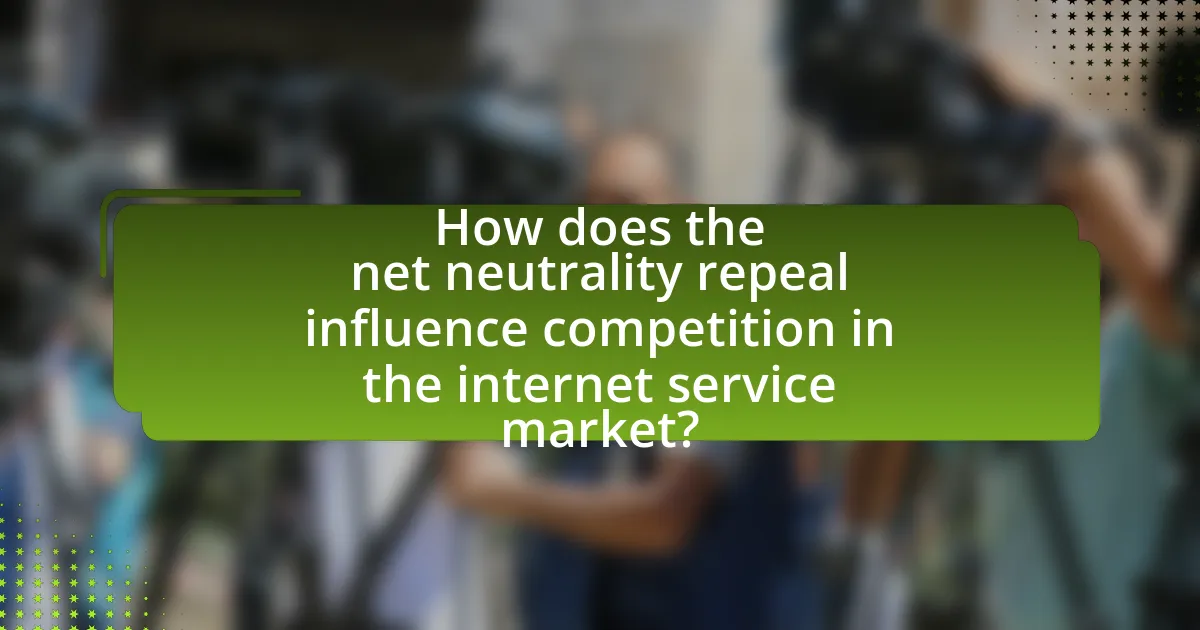
How does the net neutrality repeal influence competition in the internet service market?
The repeal of net neutrality influences competition in the internet service market by allowing internet service providers (ISPs) to prioritize their own content and services over competitors. This creates an uneven playing field where larger ISPs can leverage their position to stifle competition, as they may throttle or block access to rival services, thereby reducing consumer choice. According to a study by the Open Technology Institute, the absence of net neutrality regulations has led to increased market concentration, with a few dominant ISPs controlling a significant share of the broadband market, which further diminishes competition and innovation.
What are the risks of reduced competition among internet service providers?
Reduced competition among internet service providers (ISPs) can lead to higher prices, lower service quality, and limited innovation. When fewer companies dominate the market, consumers face less choice, which often results in ISPs having less incentive to improve their services or lower costs. For instance, a study by the Federal Communications Commission (FCC) found that areas with limited ISP competition experienced significantly higher prices for broadband services, with some consumers paying up to 50% more than in competitive markets. Additionally, reduced competition can stifle technological advancements, as ISPs may prioritize profit over investment in infrastructure and new technologies. This lack of competition ultimately harms consumers by restricting access to affordable and high-quality internet services.
How might the repeal affect new entrants in the market?
The repeal of net neutrality may create significant barriers for new entrants in the market. Without net neutrality regulations, established internet service providers (ISPs) can prioritize their own content or that of partners, potentially leading to a tiered internet where new entrants struggle to compete for visibility and access. For instance, a study by the New America Foundation indicated that the absence of net neutrality could result in increased costs for startups, as they may need to pay ISPs for better access to consumers. This financial burden can deter innovation and limit the diversity of services available to consumers, ultimately stifling competition in the market.
What role does consumer choice play in a post-repeal landscape?
Consumer choice plays a critical role in a post-repeal landscape by influencing market dynamics and service offerings. After the repeal of net neutrality, consumers have the power to select internet service providers (ISPs) based on their pricing, speed, and service quality, which can drive competition among ISPs. For instance, a study by the Pew Research Center indicates that 73% of Americans believe that consumers should have the ability to choose their internet service without restrictions. This consumer demand can compel ISPs to innovate and improve their services to attract and retain customers, ultimately shaping the internet access landscape.
How can consumers advocate for their rights in the absence of net neutrality?
Consumers can advocate for their rights in the absence of net neutrality by actively participating in public discourse, supporting legislation that promotes internet access equity, and utilizing social media platforms to raise awareness about unfair practices. Engaging with policymakers through petitions and public comments can influence regulatory decisions, as evidenced by the 2017 FCC public comment period where over 22 million comments were submitted regarding net neutrality. Additionally, consumers can support organizations that fight for digital rights, such as the Electronic Frontier Foundation, which provides resources and advocacy for internet freedom.
What actions can consumers take to ensure fair internet access?
Consumers can advocate for fair internet access by actively supporting net neutrality policies and engaging with policymakers. By contacting local representatives and expressing the importance of maintaining equal access to online content, consumers can influence legislative decisions. Additionally, participating in public comment periods during regulatory reviews allows consumers to voice their concerns directly to agencies like the Federal Communications Commission (FCC). Research indicates that public support for net neutrality is significant; a 2017 Pew Research Center survey found that 73% of Americans believed that internet service providers should be required to provide equal access to all content. This collective action can help ensure that internet access remains fair and equitable for all users.
How can public opinion influence future regulations on internet access?
Public opinion can significantly influence future regulations on internet access by shaping policymakers’ perceptions and priorities. When a substantial portion of the public expresses concern over issues like net neutrality, it can lead to increased political pressure on legislators to enact or amend regulations that protect consumer rights and ensure equitable access to the internet. For instance, following the repeal of net neutrality in 2017, public backlash, evidenced by millions of comments submitted to the Federal Communications Commission, highlighted widespread dissatisfaction and prompted discussions among lawmakers about potential regulatory reforms. This demonstrates that when citizens mobilize their opinions, it can result in tangible changes in regulatory approaches to internet access.
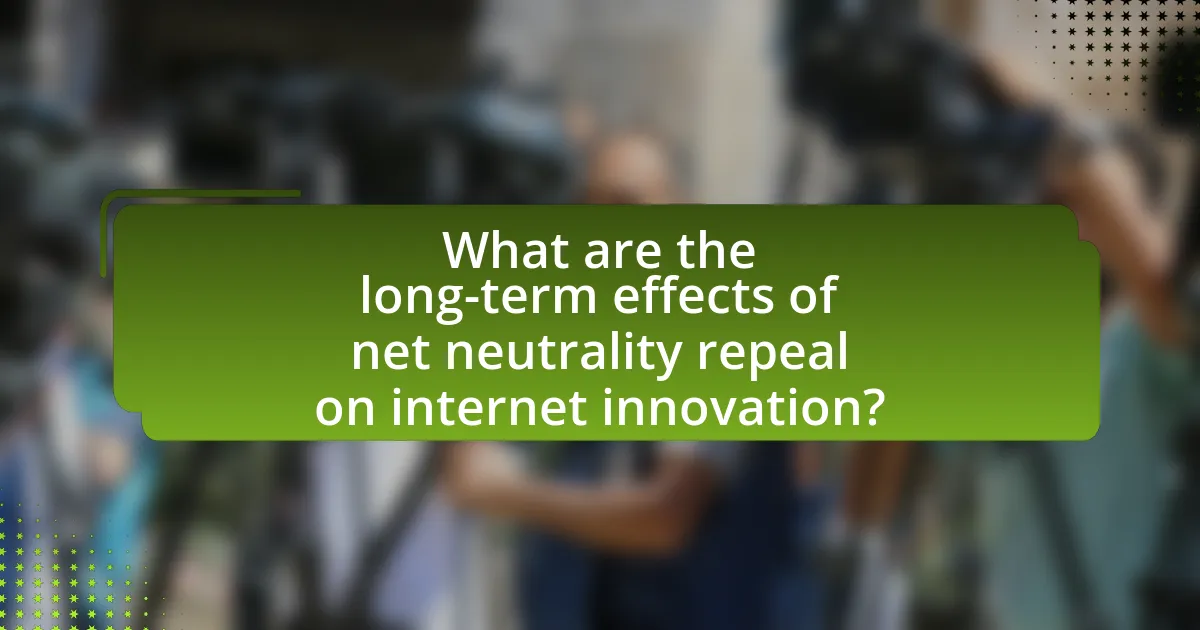
What are the long-term effects of net neutrality repeal on internet innovation?
The long-term effects of net neutrality repeal on internet innovation include reduced competition and increased barriers for startups. Without net neutrality, internet service providers (ISPs) can prioritize their own services or those of partners, leading to a tiered internet where established companies dominate. This environment discourages new entrants, as they may struggle to compete against larger firms that can afford to pay for better access. A study by the New America Foundation found that the repeal of net neutrality could stifle innovation by limiting the ability of smaller companies to reach consumers effectively. Additionally, the Federal Communications Commission’s own data indicated that investment in broadband infrastructure has not significantly increased post-repeal, suggesting that the anticipated benefits for innovation have not materialized.
How might the repeal stifle or promote technological advancements?
The repeal of net neutrality may stifle technological advancements by allowing internet service providers (ISPs) to prioritize certain content and services over others, potentially limiting access to innovative platforms that cannot afford higher fees. This prioritization can create a tiered internet where startups and smaller companies struggle to compete against established players who can pay for better service, thereby reducing diversity and innovation in technology. For instance, after the repeal in 2017, concerns arose that ISPs could throttle or block access to emerging technologies, which could hinder the development of new applications and services that rely on equal access to bandwidth.
What examples exist of innovation being impacted by internet access policies?
Innovation has been significantly impacted by internet access policies, particularly through the repeal of net neutrality in the United States. For instance, after the 2017 repeal, companies like AT&T and Verizon began prioritizing their own content over competitors, which hindered the growth of startups that could not afford to pay for better access. This created a barrier for new services and applications, limiting competition and innovation in sectors such as streaming and cloud services. Additionally, research from the New America Foundation indicated that the lack of net neutrality led to reduced investment in innovative technologies by smaller firms, as they faced uncertainty regarding their ability to reach consumers effectively.
How do different sectors of the economy respond to changes in internet access?
Different sectors of the economy respond to changes in internet access by adjusting their operational strategies, market reach, and service delivery methods. For instance, the retail sector increasingly relies on e-commerce platforms to reach consumers, leading to a significant rise in online sales; in 2020, U.S. e-commerce sales grew by 32.4% compared to the previous year, highlighting the direct correlation between improved internet access and retail performance. The education sector has also adapted by expanding online learning opportunities, with a report from the National Center for Education Statistics indicating that 75% of public schools offered remote learning options during the COVID-19 pandemic, showcasing how internet access facilitates educational delivery. Additionally, the healthcare sector has embraced telemedicine, with a study from McKinsey & Company revealing that telehealth usage increased by 38 times from pre-pandemic levels, demonstrating how enhanced internet access enables healthcare providers to offer remote consultations. Overall, sectors such as retail, education, and healthcare illustrate that improved internet access drives innovation, efficiency, and market expansion.
What strategies can be employed to mitigate negative effects of the repeal?
To mitigate the negative effects of the repeal of net neutrality, implementing regulatory frameworks that promote competition among Internet Service Providers (ISPs) is essential. Encouraging the entry of new ISPs can reduce monopolistic practices and enhance consumer choice, thereby improving service quality and pricing. For instance, cities that have adopted municipal broadband initiatives have seen increased competition and lower prices, as evidenced by studies from the Institute for Local Self-Reliance, which highlight that areas with community broadband options often experience better service and lower costs. Additionally, consumer advocacy groups can play a crucial role by educating users about their rights and available options, empowering them to make informed decisions regarding their internet services.
What best practices can consumers adopt to navigate the new internet landscape?
Consumers can adopt several best practices to navigate the new internet landscape effectively. First, they should utilize virtual private networks (VPNs) to enhance privacy and security while browsing, as VPNs encrypt internet traffic and help bypass potential throttling by internet service providers (ISPs). Second, consumers should regularly review and adjust their privacy settings on social media and other online platforms to control data sharing and protect personal information. Third, they should stay informed about their ISP’s policies regarding data usage and potential throttling, which can impact internet speed and access to content. Additionally, consumers can support legislation that promotes net neutrality to ensure equal access to all online content. These practices are essential in a landscape where the repeal of net neutrality has led to concerns about unequal access and privacy issues.
How can policymakers balance interests to protect internet access for all?
Policymakers can balance interests to protect internet access for all by implementing regulations that ensure net neutrality while fostering competition among internet service providers (ISPs). By enforcing net neutrality, policymakers can prevent ISPs from prioritizing certain content or services, thereby ensuring equal access for all users. For instance, the Federal Communications Commission’s 2015 net neutrality rules demonstrated that maintaining an open internet can lead to increased innovation and consumer choice, as evidenced by the growth of startups and online services during that period. Additionally, promoting competition through measures such as reducing barriers to entry for new ISPs can enhance service quality and affordability, further safeguarding universal internet access.
